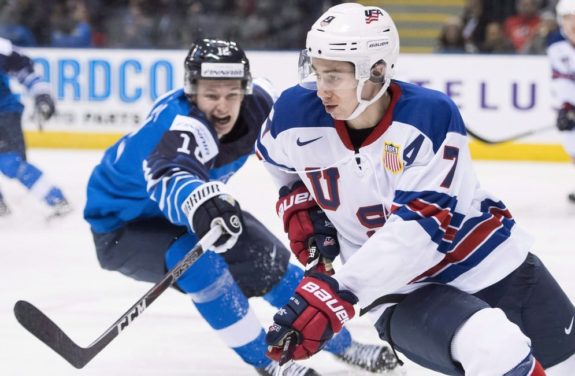Over the last five weeks, the Vancouver Canucks have four wins in 17 games. Their 11 accumulated points and .324 points percentage since Feb. 4 are the third-worst in the National Hockey League and they have scored the fewest goals of any club in that span (33).
And yet, with 13 games still remaining on the 2018-19 schedule, it’s quite possible their freefall down the standings is not quite complete, especially if their most recent 6-2 loss to the Vegas Golden Knights is any indication of what’s to come.
While Saturday’s ugly game was simply more of the same for Canucks fans, Sunday brought with it a rare ray of hope: 19-year-old defensive prospect Quinn Hughes had officially signed his three-year entry-level contract (ELC) with the Canucks.
Welcome to the #Canucks Quinn Hughes! Last year’s 7th overall pick signs a three-year entry-level contract with Vancouver. https://t.co/lDwkuR7EPU
— Vancouver Canucks (@Canucks) March 10, 2019
This was not a surprise. The assumption for quite some time was that once Hughes’ sophomore season at Michigan University was complete, he would transition immediately to the NHL. That’s exactly what happened after the Wolverines were bounced in the Big Ten quarterfinals of the NCAA playoffs this weekend by the Minnesota Golden Gophers.
While the 5-foot-10 defender is not expected to stop the bleeding for the Canucks on his own, Hughes is a welcome addition for those searching for any sign of positivity. The smooth-skating rearguard tallied 33 points in 30 regular season games this season for the Wolverines. His 1.10 points-per-game was the second-highest mark of any under-20 NCAA defenceman in the 21st century, according to Sportsnet’s Rory Boylen, trailing only Carolina Hurricanes prospect Adam Fox’s 1.14 in 2016-17 with Harvard.
He’s obviously a high priority for our group going forward and you hope the transition is clean and quick. He’s an exciting part of our future. – Canucks head coach Travis Green to Sportsnet’s Iain MacIntyre
On the one hand, it will be interesting to see how quickly Hughes finds out what he can and can’t pull off at the NHL level. On the other hand, Canucks management absolutely must manage the number of games he plays this season to under 11.
Related: Canucks’ prospect Quinn Hughes is Elite
Hughes Could be Expansion Draft Eligible
When Hughes first steps onto the ice this week, he will automatically burn the first year of his ELC, just like Brock Boeser did when he first signed with the Canucks out of college on March 25, 2017. Because Hughes is already 19 and turns 20 between Sept. 16 and Dec. 31 of this year, his contract cannot ‘slide’ under the terms of the CBA.
That’s no biggie, however. What’s far more important is this: under no circumstances can Hughes be allowed to play in 11 or more of the Canucks’ remaining 13 games because that would automatically make him eligible for the Seattle expansion draft in 2021.
#Canucks sign their 7th overall pick in 2018, Quinton Hughes to a 3 year ELC in which the first year of the contract is 2018-19.
Points to remember:
– Hughes is an EL SA 20, meaning his contract can not slide
– If he plays in 11 gms this season he'll be expansion draft eligible https://t.co/KyqR3YyxSq— CapFriendly (@CapFriendly) March 10, 2019
Should this really be a problem with the team bottoming out and only 13 games left? No, it really isn’t that hard to understand. But general manager Jim Benning didn’t inspire a ton of confidence in an interview with Mike Halford and Jason Brough in late February on TSN 1040.
First, Benning said, “I don’t think that we have a worry on defence with protection problems in that expansion draft.” When he was pressed on the issue, he was asked, “So you wouldn’t worry about him playing too many games and then all of a sudden he’s one of the guys that you would have to protect?” Benning said, “No, I’m not worried about that.”

He absolutely should be aware of this rule, because as long as Hughes plays 10 or fewer games this season, he would still count as a ‘second-year NHL player’, and therefore be exempt from selection in the expansion draft.
I know the Canucks blueline is not exactly the envy of the league, but it’s common sense to simply sit Hughes for a couple of games so that you have the option to protect both Troy Stetcher and Ben Hutton if you need to. You may not end up doing so, but it’s best to keep your options open. Remember, the Canucks have to choose whether they protect seven forwards, three defencemen and one goalie, or eight skaters (forwards/defensemen) and one goalie. Another thing to remember is this: if veteran defenceman Alex Edler is given a no-move clause through the 2021 season on his next contract, he will automatically have to be protected, unless he agrees to waive that clause (unlikely).
Related: Canucks Need to Be Careful With Edler Extension
With Boeser, the Canucks didn’t have to worry about this situation because he was already exempt from being selected in the 2017 expansion draft. It’s important to note he did play in all nine Canucks’ games after signing his ELC on March 25. Sitting Hughes — who’s your golden prospect — right after signing him doesn’t look great, but given the clear ramifications, it’s clearly necessary. Let’s hope Benning and Co. realize its importance before it’s too late.